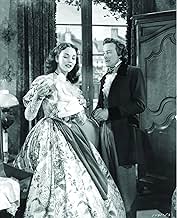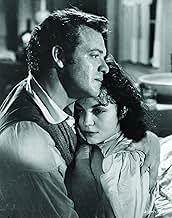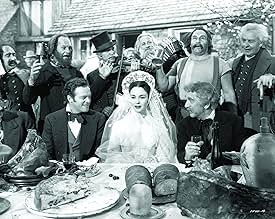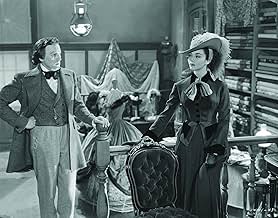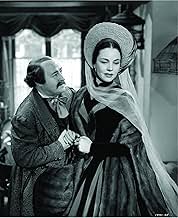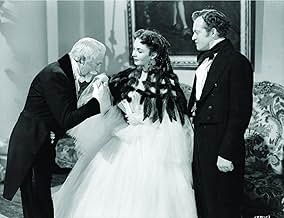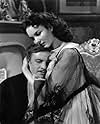NOTE IMDb
7,0/10
3,1 k
MA NOTE
Les illusions romantiques de la femme d'un médecin de province sur la vie et le statut social la conduisent à trahir son mari naïf, à se faire des amants et à accumuler des dettes ruineuses.Les illusions romantiques de la femme d'un médecin de province sur la vie et le statut social la conduisent à trahir son mari naïf, à se faire des amants et à accumuler des dettes ruineuses.Les illusions romantiques de la femme d'un médecin de province sur la vie et le statut social la conduisent à trahir son mari naïf, à se faire des amants et à accumuler des dettes ruineuses.
- Réalisation
- Scénario
- Casting principal
- Nommé pour 1 Oscar
- 2 victoires et 1 nomination au total
Alf Kjellin
- Leon Dupuis
- (as Christopher Kent)
Harry Morgan
- Hyppolite
- (as Henry Morgan)
Avis à la une
Though I'm sure that the various French dramatizations of Madame Bovary are probably superior to this film, this English language version that MGM did in 1949 is as good as any we would have gotten from Hollywood. of that era. Jennifer Jones, Van Heflin, Louis Jourdan, and James Mason were unfortunately hampered by the Code in this version.
MGM's version incorporates the author right into his story. James Mason plays Gustave Flaubert and the film opens with him on trial for authoring indecent material as the French censors of the day saw Madame Bovary. While on the witness stand defending his work, he tells the story of his creation Emma Bovary, a girl with silly romantic notions who brings tragedy all around because of them.
Jennifer Jones is Emma and imagine Bernadette Soubirous who instead of having a divine experience has the misfortune to have other things peak her interest as an adolescent. She reads a whole lot of romantic novels who give her exaggerated notions about the nature of love.
She lives in a pretty dull town in Normandy which was also where Flaubert himself hailed from and which he satirizes in acid in this work. She marries solid, dependable Van Heflin who's a doctor and who she hopes will give her a better life.
It's in Heflin's character that the Code watered down what Flaubert was trying to say. Here he's an upright guy, a lot on the dull side, but dependable. In the novel he's as much desiring of social climbing as Jones is. In fact in the film he refuses to perform an operation that might gain him fame and success because he knows he's not qualified to do it. In the novel he does the operation and it ends in disaster all around.
Jones takes lovers Louis Jourdan and Alf Kjellin and runs up bills that put Heflin into financial disaster. All the while refusing to face the truth about life and herself.
Given the Code restrictions director Vincente Minnelli does as best as he can with his cast. James Mason makes a brilliant and erudite Flaubert on the stand. But considering he was on trial for indecency by not showing the alleged indecency to the fullest the Code defeated what could have been a classic.
MGM's version incorporates the author right into his story. James Mason plays Gustave Flaubert and the film opens with him on trial for authoring indecent material as the French censors of the day saw Madame Bovary. While on the witness stand defending his work, he tells the story of his creation Emma Bovary, a girl with silly romantic notions who brings tragedy all around because of them.
Jennifer Jones is Emma and imagine Bernadette Soubirous who instead of having a divine experience has the misfortune to have other things peak her interest as an adolescent. She reads a whole lot of romantic novels who give her exaggerated notions about the nature of love.
She lives in a pretty dull town in Normandy which was also where Flaubert himself hailed from and which he satirizes in acid in this work. She marries solid, dependable Van Heflin who's a doctor and who she hopes will give her a better life.
It's in Heflin's character that the Code watered down what Flaubert was trying to say. Here he's an upright guy, a lot on the dull side, but dependable. In the novel he's as much desiring of social climbing as Jones is. In fact in the film he refuses to perform an operation that might gain him fame and success because he knows he's not qualified to do it. In the novel he does the operation and it ends in disaster all around.
Jones takes lovers Louis Jourdan and Alf Kjellin and runs up bills that put Heflin into financial disaster. All the while refusing to face the truth about life and herself.
Given the Code restrictions director Vincente Minnelli does as best as he can with his cast. James Mason makes a brilliant and erudite Flaubert on the stand. But considering he was on trial for indecency by not showing the alleged indecency to the fullest the Code defeated what could have been a classic.
Jennifer Jones was a star I knew well from visits to the cinema with my family during the 1950's: "The Man in the Grey Flannel Suit", "The Barretts of Whimpole Street", "Love is a Many Splendored Thing" and "A Farewell to Arms".
I cut in on her at a certain stage in her career. She was a bit older than my mum, and although I liked her she didn't have the effect on a prepubescent lad that Yvette Mimieux or Tuesday Weld were having.
It wasn't until later, when we got television, that I saw the movies she made earlier in her career; "Song of Bernadette, "Duel in the Sun", "Portrait of Jennie", "Carrie" and this one: Vincente Minnelli's "Madame Bovary". What an absolute stunner she was.
Emma Bovary (Jennifer Jones) is the beautiful daughter of a poor French family, but she has an overactive imagination fostered by romantic novels.
She marries a country doctor Charles Bovary (Van Heflin) who she doesn't really love hoping to advance her standing in society and pursue her romantic dreams. However she soon outspends her husband's capacity to earn. In an era before credit cards, she maxes-out on credit notes.
Emma attracts men like moths to a flame, and cheats on her husband who still loves her despite everything. There are tears before the final fade out.
The film is bookended with the trial of Gustave Flaubert who wrote the original novel. Apparently the story so outraged the French hierarchy that they took old Gustave to court. He got off and of course the book became a bestseller.
The filmmakers used the trial to allow Gustave (James Mason) to narrate the story - quoting passages of Flaubert's prose. Although narration can be a lazy device in film, in this case, Mason's mellifluous voice puts us in the picture quickly. More importantly, Emma is seen sympathetically despite being hopelessly self-focused.
Two actors added the final touch of class to the 1949 version. Van Heflin is such a nice guy here that we are waiting for someone to smack Emma to her senses. Louis Jordan gives another variation on that smooth roué he played in "Letter to an Unknown Woman" - a not dissimilar drama.
Composer Miklos Rozsa surpassed himself with the score. With its beautiful main theme for Emma and flowing melodies it sweeps you along.
A 2014 version did away with narration. It's more low-key, but quite good with a totally different vibe to the Minnelli version. It was filmed in France and is more explicit with a fair bit of nudity. Jennifer Jones was fortunate that her movie career was in an era where she didn't have to worry about getting in shape for that kind of thing.
I cut in on her at a certain stage in her career. She was a bit older than my mum, and although I liked her she didn't have the effect on a prepubescent lad that Yvette Mimieux or Tuesday Weld were having.
It wasn't until later, when we got television, that I saw the movies she made earlier in her career; "Song of Bernadette, "Duel in the Sun", "Portrait of Jennie", "Carrie" and this one: Vincente Minnelli's "Madame Bovary". What an absolute stunner she was.
Emma Bovary (Jennifer Jones) is the beautiful daughter of a poor French family, but she has an overactive imagination fostered by romantic novels.
She marries a country doctor Charles Bovary (Van Heflin) who she doesn't really love hoping to advance her standing in society and pursue her romantic dreams. However she soon outspends her husband's capacity to earn. In an era before credit cards, she maxes-out on credit notes.
Emma attracts men like moths to a flame, and cheats on her husband who still loves her despite everything. There are tears before the final fade out.
The film is bookended with the trial of Gustave Flaubert who wrote the original novel. Apparently the story so outraged the French hierarchy that they took old Gustave to court. He got off and of course the book became a bestseller.
The filmmakers used the trial to allow Gustave (James Mason) to narrate the story - quoting passages of Flaubert's prose. Although narration can be a lazy device in film, in this case, Mason's mellifluous voice puts us in the picture quickly. More importantly, Emma is seen sympathetically despite being hopelessly self-focused.
Two actors added the final touch of class to the 1949 version. Van Heflin is such a nice guy here that we are waiting for someone to smack Emma to her senses. Louis Jordan gives another variation on that smooth roué he played in "Letter to an Unknown Woman" - a not dissimilar drama.
Composer Miklos Rozsa surpassed himself with the score. With its beautiful main theme for Emma and flowing melodies it sweeps you along.
A 2014 version did away with narration. It's more low-key, but quite good with a totally different vibe to the Minnelli version. It was filmed in France and is more explicit with a fair bit of nudity. Jennifer Jones was fortunate that her movie career was in an era where she didn't have to worry about getting in shape for that kind of thing.
Madame Bovary is directed by Vincente Minnelli and adapted to screenplay by Robert Ardrey from the Gustave Flaubert novel. It stars Jennifer Jones, Van Heflin, Louis Jourdan, Alf Kjellin, Gene Lockhart and James Mason. Music is by Miklós Rózsa and cinematography by Robert H. Planck.
It's most interesting now watching Minnelli's picture and being able to place it in the time it was made. Also of major interest is reading up on what the critics of the time had to say about it. This version is an undoubted lesson in the technical crafts of film making, the visuals, the sound, art design, costuming and a literary pumped screenplay that allows the cast to play it classical. It's also black hearted, perfectly in keeping with the gathering storm of the era that was film noir.
Here is the monster.
Some of the complaints about the film, to me anyway, just don't add up. Why do we need to care about anyone in this story? It's a dark tale of illicit passions, greed, betrayals, bad parenting and etc. Is this frowned upon in some circles because of love for the classic novel? Or because there's some esteem held for other versions? The criticism of Jones is also very suspect given it's a classic femme fatale performance, Emma is cold and driven and shallow to others feelings, Jones works it perfectly.
As Rózsa's beautiful lush and poignant musical arrangements drift and hover over the various story instalments, Minnelli brings the film making guile. His camera work is sublime, like a ghost moving about the characters for the more vibrant scenes, tracking and roving, dizzyingly beautiful. At others it's close and personal, imbuing Emma's claustrophobia, with the black and white contrasts superbly photographed by Planck.
So it doesn't capture the essence of Flaubert's intent, then? Emma Bovary a figure of hate instead of sympathy, the lack of a caustic aside on a society of double standards? So what! Outstanding film making is just that, especially when it can tune into a style of film making prevalent at its birth. Madame Bovary - maybe the most film noir movie not actually considered a film noir. Brilliant. 9/10
It's most interesting now watching Minnelli's picture and being able to place it in the time it was made. Also of major interest is reading up on what the critics of the time had to say about it. This version is an undoubted lesson in the technical crafts of film making, the visuals, the sound, art design, costuming and a literary pumped screenplay that allows the cast to play it classical. It's also black hearted, perfectly in keeping with the gathering storm of the era that was film noir.
Here is the monster.
Some of the complaints about the film, to me anyway, just don't add up. Why do we need to care about anyone in this story? It's a dark tale of illicit passions, greed, betrayals, bad parenting and etc. Is this frowned upon in some circles because of love for the classic novel? Or because there's some esteem held for other versions? The criticism of Jones is also very suspect given it's a classic femme fatale performance, Emma is cold and driven and shallow to others feelings, Jones works it perfectly.
As Rózsa's beautiful lush and poignant musical arrangements drift and hover over the various story instalments, Minnelli brings the film making guile. His camera work is sublime, like a ghost moving about the characters for the more vibrant scenes, tracking and roving, dizzyingly beautiful. At others it's close and personal, imbuing Emma's claustrophobia, with the black and white contrasts superbly photographed by Planck.
So it doesn't capture the essence of Flaubert's intent, then? Emma Bovary a figure of hate instead of sympathy, the lack of a caustic aside on a society of double standards? So what! Outstanding film making is just that, especially when it can tune into a style of film making prevalent at its birth. Madame Bovary - maybe the most film noir movie not actually considered a film noir. Brilliant. 9/10
Gustave Flaubert's Madame Bovary is beautiful and shocking, one of the European literary greats. While it is not the most faithful adaptation around, Vincente Minnelli's Madame Bovary does stand on its own two feet and is a beautiful film in its own right. It does suffer from what made the book so complex and shocking not being fully allowed to come out due to the limitations of the Production Code at the time of it being made and released(maybe the film's length too). So you do miss the stuffiness and hypocrisy of French provincial life, which I always took as a crucial part to Emma's character, while the script could have done with more of a dark edge and Minnelli's direction is often dazzling and technically skilled(the ballroom sequence has to be a highlight in his directorial career) but also a little too relaxed in places, so the drama has occasional stodginess. But it is unfair to dismiss Madame Bovary due to these because its positives are a great many. That it is one of the most visually beautiful films of the 40s is one, the costumes are evocative and astonishingly elegant, Emma's dresses are a wow factor while the sets are the very meaning of grand with a Baroque/Roccocco influence. The photography dazzles just as much as Minnelli's technical style in the ballroom sequence(an intricate and in all senses wonderful scene, perhaps one of the greats in cinematic history). Miklos Rosza's music score is another huge part of the appeal, one of his best, the stylistic elegance, haunting undercurrent and energy are all here in the score, the Madame Bovary Waltz being the most memorable.
The script may lack edge, but it does maintain the book's ironic humour and is very poignant too without descending into melodrama, and the story regardless of the watering down still compels and moves. Some may find Flaubert's narration and trial at the beginning unnecessary, to me it was actually very interesting- James Mason's thoughtfully earnest performance as Flaubert helps- and that the book itself caused a scandal at the time and is still controversial now made it further easier to understand why the book's depth doesn't quite come through here. The aforementioned ballroom sequence is the highlight of the film, but the deserted windswept streets in the middle of the night scene where Emma is waiting for Rudolphe is beautifully shot and emotionally telling. The performances are fine, Jennifer Jones is very moving(not to mention stunning to look at), she does capture the selfishness and insufferable woman traits that Emma has yet makes it clear Emma is also a victim of her own passions, it is very easy to not stand Emma and make her one-dimensional but with Jones there is a degree of compassion. Van Heflin is sympathetic and mild-mannered without being too much of a bore and oafish without being too much of a dork and clown, like with Jones both of those are easy traps to fall into. Louis Jourdan is perfectly cast, suave and charismatic while conflicted and menacing. Alf Kjellin is a gentle Leon, a good contrast to Jourdan's Rudolphe, while Gladys Cooper as ever is a scene stealer as is Frank Allenby as the malefic L'Hereux. Harry Morgan and Gene Lockhart are dependably solid. Overall, a beautiful film but those wanting a faithful adaptation of Madame Bovary(a big ask really as it is perhaps one of the most difficult books to adapt) may want to look elsewhere. But even then, there will be people who think that to some extent but still take this film for what it is. 8/10 Bethany Cox
The script may lack edge, but it does maintain the book's ironic humour and is very poignant too without descending into melodrama, and the story regardless of the watering down still compels and moves. Some may find Flaubert's narration and trial at the beginning unnecessary, to me it was actually very interesting- James Mason's thoughtfully earnest performance as Flaubert helps- and that the book itself caused a scandal at the time and is still controversial now made it further easier to understand why the book's depth doesn't quite come through here. The aforementioned ballroom sequence is the highlight of the film, but the deserted windswept streets in the middle of the night scene where Emma is waiting for Rudolphe is beautifully shot and emotionally telling. The performances are fine, Jennifer Jones is very moving(not to mention stunning to look at), she does capture the selfishness and insufferable woman traits that Emma has yet makes it clear Emma is also a victim of her own passions, it is very easy to not stand Emma and make her one-dimensional but with Jones there is a degree of compassion. Van Heflin is sympathetic and mild-mannered without being too much of a bore and oafish without being too much of a dork and clown, like with Jones both of those are easy traps to fall into. Louis Jourdan is perfectly cast, suave and charismatic while conflicted and menacing. Alf Kjellin is a gentle Leon, a good contrast to Jourdan's Rudolphe, while Gladys Cooper as ever is a scene stealer as is Frank Allenby as the malefic L'Hereux. Harry Morgan and Gene Lockhart are dependably solid. Overall, a beautiful film but those wanting a faithful adaptation of Madame Bovary(a big ask really as it is perhaps one of the most difficult books to adapt) may want to look elsewhere. But even then, there will be people who think that to some extent but still take this film for what it is. 8/10 Bethany Cox
Although it is several years since I saw it I can remember the beautiful photography and period setting of this not very happy story of a tormented woman.Particularly Jennifer Jones,a vastly underrated actress giving a sensitive performance which one imagined could have done with a bit more directoral guidance. Minnelli was one of those directors who seemed to give all or nothing to his projects.By his own admission he had very little interest in "Kismet" as he wanted to get it out of the way in order to start "Lust for Life" with Kirk Douglas.The lumbering manner of "Kismet" shows this to be true !! (he owed MGM one picture under his contract before starting "Lust for Life" and unfortunately for the project "Kismet" was it)Additionally Minelli did not want Jones in the lead role and one wonders how influencial David Selznick was in pushing for Jennifer once Lana Turner was unavailable for the lead.At any rate Lana had not yet developed her dramatic abilities which would lie some years ahead.Jennifer showed that she was adaptable to many moods including a few years later her scene stealing turn in "Beat the Devil" few actresses can take credit for stealing a picture away from Bogie,Peter Lorre,Robert Morley and LaLolla. Back to Madame Bovary,although the subject is a heavy one,it is well handled by Minnelli,and most reference books today regard it as a sadly neglected piece,which deserves a wider recognition.Interestingly if my memory serves me correctly Vincente barely mentions it in his autobiography.Maybe his private life at the time and his more financially successful works figure more prominantly in his memory.If I had directed Madame Bovary I would be immensly proud of it.Maybe he was.
Le saviez-vous
- AnecdotesAfter the expensive box-office failure of Le pirate (1948), director Vincente Minnelli worked hard to cut corners on this film, fearing he might be accused of extravagance. However, he devoted a great deal of time to the ball sequence, which he regarded as the most important scene in the film; he even had composer Miklós Rózsa compose the waltz theme used in it well in advance of the start of filming.
- GaffesWhen Madame Bovary asks Leon for money, he reacts by punching out one of the glass window panes. But on the next cut, the previously shattered window pane is now intact.
- Citations
Emma Bovary: Do you know, Charles, why that clock strikes? To announce the death of another hour.
- Versions alternativesAlso shown in a computer colorized version.
- ConnexionsFeatured in Some of the Best: Twenty-Five Years of Motion Picture Leadership (1949)
Meilleurs choix
Connectez-vous pour évaluer et suivre la liste de favoris afin de recevoir des recommandations personnalisées
Everything New on HBO Max in August
Everything New on HBO Max in August
Looking for something different to add to your Watchlist? Take a peek at what movies and TV shows are coming to HBO Max this month.
- How long is Madame Bovary?Alimenté par Alexa
Détails
- Date de sortie
- Pays d’origine
- Site officiel
- Langue
- Aussi connu sous le nom de
- Madame Bovary und ihre Liebhaber
- Lieux de tournage
- Société de production
- Voir plus de crédits d'entreprise sur IMDbPro
- Durée
- 1h 54min(114 min)
- Couleur
- Rapport de forme
- 1.37 : 1
Contribuer à cette page
Suggérer une modification ou ajouter du contenu manquant


